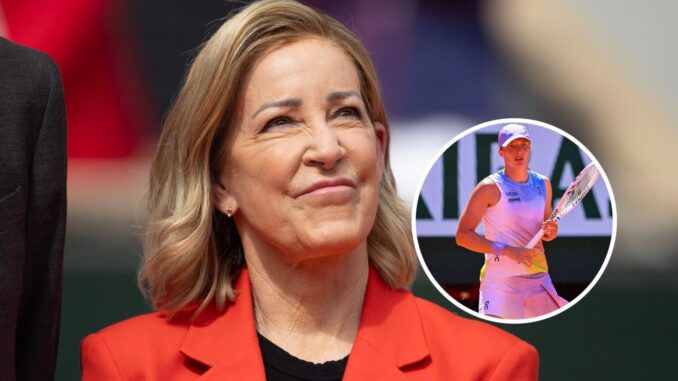
The electric atmosphere of Roland Garros was palpable on June 1, 2025, as Iga Swiatek, the four-time French Open champion, faced a daunting challenge against Elena Rybakina in a gripping fourth-round clash. The match, a two-and-a-half-hour rollercoaster, saw Swiatek rally from a devastating 1-6 first-set loss to secure a 1-6, 6-3, 7-5 victory, preserving her hopes of a fourth consecutive title. Off-camera, tennis legend Chris Evert, an 18-time Grand Slam champion and seven-time Roland Garros winner, shared candid concerns about Swiatek’s mental state as the Pole struggled early against Rybakina’s relentless power. Evert’s remarks, made during a TNT Sports broadcast, painted a vivid picture of a champion grappling with a crisis of confidence, even as she fought to reclaim her dominance on her favorite clay courts.
Swiatek’s 2025 season has been a shadow of her former brilliance, marked by a title drought since her 2024 French Open triumph and a slide to No. 5 in the WTA rankings. As Rybakina stormed to a 5-0 lead in the first set, Evert observed, “She hasn’t won a tournament in a year. She hasn’t won a tournament since last year’s French Open. So this has been going on for a while.” The American icon, known for her own clay-court mastery, noted how Swiatek’s struggles were compounding her mental fragility. “Slowly that just builds and builds and builds the more you lose the more you lose confidence in your game,” Evert said, pinpointing the psychological toll of Swiatek’s losses to players like Coco Gauff in Madrid and Danielle Collins in Rome. The Pole’s 27 unforced errors in the opening nine games against Rybakina underscored this vulnerability, as her forehand, typically a weapon, faltered under pressure.
Evert’s off-camera analysis highlighted a shift in the WTA landscape, where Swiatek’s once-feared aura on clay was fading. “The players know a strategy now how to play Iga and they know she’s not invincible anymore because she’s lost some matches,” she remarked, emphasizing how opponents like Rybakina, with her powerful serve and flat groundstrokes, were exploiting Swiatek’s weaknesses. Rybakina, fresh off a Strasbourg title and a nine-match win streak, dominated early with a 6-1 set, leaving Swiatek reeling. “The first set, I felt like I was playing against Jannik Sinner,” Swiatek later admitted, a nod to Rybakina’s aggressive, almost masculine hitting style. Evert’s concern extended to Swiatek’s doping case from 2024, which, though unintentional, had left a mark. “We didn’t talk about the doping case. I think that really affected her personally because she’s very aware of what people think about her,” Evert said, suggesting the emotional weight of public perception was another hurdle.
Despite the grim outlook, Evert saw hope in Swiatek’s familiarity with Roland Garros’ slower clay, which suits her spin-heavy game. “This clay at Roland-Garros is a slower court than in Rome and Madrid. She can very well find her game,” Evert noted, urging Swiatek to rediscover her aggression. The Pole heeded this advice, adjusting her return position to counter Rybakina’s serve, a tactic inspired by coach Wim Fissette. “I think the coaching actually really helped me today,” Swiatek said, crediting her deeper stance for turning the match around. A missed smash by Rybakina at a critical juncture allowed Swiatek to level the second set, and her forehand roared back to life, producing winners to clinch the 7-5 decider. “I’m glad it worked,” she said, relieved to have survived a match that tested her 25-match Roland Garros win streak.
Evert’s empathy for Swiatek was palpable, rooted in her own experience as a champion. “I was a champion and I know how it feels when you lose that edge against the other players,” she said, expressing hope that Swiatek, a “nice person” and one of the greatest clay-courters, could reclaim her form. With a quarter-final against Elina Svitolina looming, Swiatek’s ability to reset mentally will be crucial, especially with 2,000 ranking points to defend. Her 38-2 record at Roland Garros, tying Evert’s Open Era mark for most wins in a player’s first 40 matches, underscores her potential to surpass even Evert’s seven titles. “I think she just has to really get it back the first couple matches,” Evert advised, emphasizing aggressive play and mental toughness. As Swiatek navigates this pivotal moment, Evert’s words serve as both a warning and a rallying cry for a champion determined to rise again.
Leave a Reply